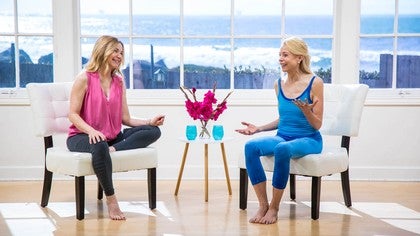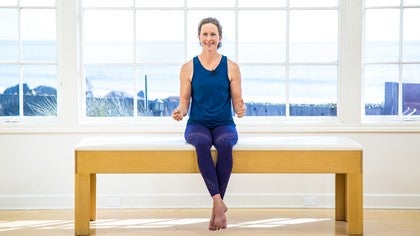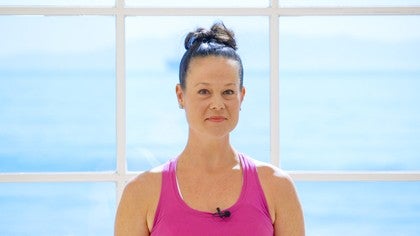Read Full Transcript
Welcome to Palladio's anytime. I'm Elizabeth Larkam. Thrilled to be here with Amy havens. In conversation over the past year or so. Amy and I have been in discussion via text. Usually I'm from different continents, different time zones, asking each other how do you take care of yourself?
How is it so challenging? How do you meet the challenges of doing your best work of teaching and practicing [inaudible] agreed, consulted Elizabeth because of your experience and, and my growing need to gain more experience in this topic. I've asked her yet exactly how, how do you take care of your sleep, um, when you need to be so focused the next day for work, when sleep is so important, your diet, not having an upset tummy if you're on the road, uh, and the physical practice of your own plays practice when you're then sitting in planes, walking in airports, lugging the things, and then expect it to go beyond the next day. So Elizabeth has years of experience to share with all of us and I've, I have taken advantage of that. So thank you. Thank you Annie for that opening. Today we're going to focus on the circadian rhythm, the, the clock, the biological clock that each cell has.
Because when it comes to self care, I get absolutely overwhelmed and sometimes the overwhelmed just adds more stress to the, to the whole project. Like, Oh, I have to get up early enough in turn so I can get in my meditation and then take care of my skin. And then there's all the vitamins and the supplements and then you have to get to bed in time just to get enough sleep. It's really overwhelming. Yes. So I've been searching for information that's not so commonly available, but information that can help to simplify, um, our self care and also help to amplify its effects, its positive effects. So the articles in the books that I've been looking at, um, we will list in our references for this talk, this discussion. They are, uh, centering around the circadian rhythm circa diem around a day with the understanding from recent research that each of our, each of ourselves and each of our organs has its own clock and its own appropriate rhythm for repair, for rejuvenation. We can amplify our best efforts at self care when we are in sync with our sleep, our exercise and our nutrition.
They Bray together and interact as can't wait to read the book more fully. Um, and I have heard a quote recently from Bonnie braid Bainbridge Cohen of uh, I'm not saying no to you. I'm saying yes to myself. Someone in our, in our politesse industry quoted that recently, that really struck me last week particularly. And I, I'm, I'll be bringing that along with me and everywhere I go and, and all the ways, whether I'm at home and my home studio here at work on the road at work, but making the choices of what to, to eliminate and what to not, um, in self care, which is such a topic these days. Thankfully. Imagine, I can imagine that your clients will, will really benefit from the example that you set. I hope so. I think so. I intend to have that happen because if we're not good for ourselves, we know this, we're not good for others and uh, it comes down to our responsibility to take care of ourselves. So on these, on these ideas.
And sleep is a big topic these days too. I've been seeing in reading and hearing. Um, so in this discussion and elsewhere and the amount of sleep we all need is different. That's your we're saying since we're here in discussion at Pilati is anytime, um, I'm going to focus on the, uh, the recent research that has to do with exercise with movement and the circadian rhythms or the circadian code because it would be fascinating to have, um, you know, a show on cooking anytime or eating anytime because that's important for our self care or sleeping anytime. And um, certainly we could get all excited about having a, uh, a network called shopping anytime because there are so many cool self care gadgets and items to invest in. But then it all comes down to the time and the rhythm for when to how to nurture your, uh, cellular rhythms the best. Since we're here at Palladio's anytime and we are interested in exercise at any time. Um, I've been learning that there are three main times during the day that one could exercise or one could have a [inaudible] practice or a, uh, movement practice that, uh, augments, integrates with Peloton.
Do tell. Yes. So it's in the morning exercise in the morning, um, gives you the advantage of having light and the appropriate amount of light in the appropriate amount of blue light to stimulate your brain to remind the brain it's time to wake up. It's morning now, um, time to not just rise and shine but also prepare for a, a focused concentration. That morning exercise can help, which will be maybe 30 minutes before sunrise to two hours after sunrise, um, is timed so that um, that activity will work as a mood elevator. Elevate the cortisol levels to a healthy degree, which reduces inflammation and also sets in motion. The, uh, the blood sugar management that we all need.
Makes a lot of sense. My natural senses to want to get up first thing in the morning and move and take a walk or my quiet time. Then I've started to discipline myself more and more as a sunrise. It feels good. Natural. And the second time, yes. I appreciate that you are a, I'm a morning person and carve that time out. Um, getting there. Oh Lord. It's a challenge for me because I need to be in San Francisco, in the studio, um, with the heat on and the lights on when the first client comes in at 7:00 AM and I am not sufficiently disciplined to get up at four 30 to do my bright sunrise.
Well, it's not that bright that early in the morning. Is that, would that be your preferred time though? First thing, I imagine that it is. It is. I find I just do so much better work for my clients. Yeah. When I have moved myself, nourish yourself, I'm going to, I like to, can we use the word nourish? Yes. I like that word. It is a nourishment. So if you don't, okay. So what's the second, another time.
The second time of the day that's so effective for um, exercise, exercise more in the strength training mode, the resistance training, the strength training mode is from three in the afternoon until dinner time. It's in that later afternoon time that the, that the internal clocks, the circadian rhythms of the, of the muscles are most primed for having their strongest other strongest output. So you can be, make more gains, more effective gains in terms of strength training in that later afternoon time of exercise. Also the later afternoon time of exercise from three until dinner time is a very good time during which to do, um, the aerobic training. Um, or the more extreme sports. I mean, look at me, I'm no extreme sports girl, but anyway, um, one could do extreme in the afternoon and that would be far better than deciding, Oh my God, I haven't fit my exercise in today. It's 9:00 PM at night time to kick it up. No, not the time to kick it up. No, I didn't make it up. No. The, the exercise in the strength training and the more demanding work in the late afternoon, um, takes advantage of your muscle clocks. And it also takes advantage of the fact that following the exercise, um, with a protein rich meal will ensure that you have the nutrients you need when it goes into the evening time of repair and regenerate, rejuvenate.
So all the, all the health clubs out there that, you know, their, their class programming, those, I would S I mean the one I belong to, the classes in the evening time are packed and they're the, they're the, these classes, the more strenuous and vigorous, I mean do they know that they're following science or are they just getting lucky with the after work crowd but it seeming to make some sense out of maybe the lot of fortunate, you know, you just, you just love it when marketing and the new science are working together. I think they get lucky. So, yeah, maybe so. Right. The, the, the morning exercise would be, um, cause I didn't mention what type of exercise is optimal in the morning, but um, if one has the opportunity to do a brisk walk outdoors, that's lovely. Um, if the outdoors is not available or if the outdoors is not as gorgeously bright as it is, um, for us today, then choosing to exercise under a bright light in the morning would be optimal rather than going to a darker cocooned corner. Okay. So we've, we've discussed some about the, the morning exercise. It's benefits for the brain. Um, the afternoon exercise, its benefits for the rejuvenation of the muscle tissue, um, and the coordination being optimal motor control being optimal in that later afternoon time when it comes to exercising after dinner or before bed, some is better than not at all. Okay.
Because evening exercise, um, will be like taking a, a blood sugar pill. It will help to improve, um, the, the glucose levels and keep the glucose levels at, at a lower pace before the bedtime, before rejuvenation. If, however, um, one is, uh, uh, choosing for an evening exercise regimen, um, it's generally preferred not to do the high intensity aerobic interval training at that time because that kicks the cortisol levels up. It revs up the system, which, uh, interferes with the production of melatonin. If your body is getting mixed signals and there's nothing like a health breakdown to give in than to give to, to cause wreak havoc in the rhythm of our circadian rhythms, our circadian cells. So if you, if, if the evening exercise is your choice, then choose something from Palladio's anytime, um, that will help to um, uh, lower your, your blood sugar levels. Um, make sure that your, your neuro Myall Fashional system is gliding well, so your sleep rejuvenation can be the optimal time for the repair. Regeneration of the muscle tissue, the, the connective tissue, the fascia, um, the cartilage and the bone.
This is so compelling and I want to share our experience with everyone that's watching. The other night, I had the honor to have a session with Elizabeth here Sunday night as we were preparing today's Tuesday that we're filming. And we did an an oof session. I've been having sleep trouble the past couple of years. I'm in that mid age kind of place. Um, so some hormonal fluctuation, et cetera, and some stress, um, that I am experiencing. I haven't slept. And I'm not just, this is not for camera. I haven't slept with that peacefully, uninterrupted, not tossing, turning in, I want to say months because it's memorable to me. I, and you saw me yesterday morning, I was bright, refreshed, very clear, and it was Ooh, work. And so, and that was, it's, I'm not as, uh, seasoned in the move work. So it was refreshing to really just allow that natural movement to be, and my system really felt harmonized afterward. Um, so thank you for that. So if you're curious what w w what I, you know, I'm going to share my experience or a meditation or a soft yoga practice or something, um, would, would feel really nice for me as well.
But I'm so glad that, that, uh, that worked out well for you. It's heaven because Amy and I work, we're getting in sync. Not only are our own circadian rhythms and getting in sync with each other because we were preparing for you to a variable intensity interval training classes have a lot of high intensity jumping on the reformer. And I knew that we would be shocked if we, um, just bolted out of nowhere and started doing that. So our evening exercise was the, uh, was a series of movements that are kind for the neuro myofascial system to make sure that, uh, we were in a calm state and seems like you were in a rejuvenated state, rejuvenated and focus and felt ready for that challenge. And you know, I know the scheduling wasn't DOD just happen chance that we put the timing of our filming of those intense classes where they were on their schedule. But I think going forward on, uh, on our path of, you know, following this advice and suggestions, science and research, it seems fairly simple that we follow this structure for our wellbeing and our health and stamina. Yes.
Yes. You may be thinking as I would be thinking if I were not, I'm under these bright lights. You may be thinking like, good Lord, um, my day is packed enough already. I have responsibilities in the morning for my children, for my work, uh, for my family, um, in the late afternoon. Like, who are you kidding? Am I leaving work at three o'clock in the afternoon? Because, you know, liver says, I've got to go now. I got to go exercise. My muscles were going to feel much better. They're like, yeah, you sit down in front of that, in front of that computer and then at nighttime, Oh my goodness. You know, there's, they're, the devices are calling for the, the emails that haven't gotten the attention yet. So it sounds good in principle, but how really to work this into a, to each person's life, which is already highly over-scheduled and very demanding thoughts.
Yes. Help us out even more. Glad you asked. That's right. What I've read is at least the American heart association says that, um, 30 minutes of exercise, moderate exercise five times a week has significant health benefits and it doesn't have to be continuous exercise. You could have 15 minutes of something in the morning and 15 minutes. Um, you know, next to your desk in the afternoon. Mm.
You could be, I mean, are are you fabulously optimal? Well, maybe not that, but, but we'll take it to be better to tomorrow than today. So, um, we just want to assure you, um, that we're not adding a backpack of guilt to your already out long list of resolutions. Hmm. I love it. I love it. Okay. So I'm so motivated. I'm already thinking about the teachers at my studio and all of our clients that we work with that ask about this topic that we can continue to encourage if you can't do a certain long, like 30 minutes of extended time, the short bursts are good. Yes. The short segments are beneficial and we can, and we should encourage that rather than not. And there are so many choices. Of course, this platform is amazing. No for that because we have short segments and long segments to choose from.
But yeah. Um, a brisk walk is better than nothing. So that after dinner stroll is okay. Is it good? Better than okay. Yeah. Yes. Your blood sugar will thank you. Ah, yes, yes. Now on the subject of devices, how necessary that our screens are for our connectivity in the world and oftentimes for tracking ourselves, you know, the 10,000 steps are however many steps one is destined to take for the day. Um, apparently the blue light probably not news to you.
The blue light that is emitted from our devices, um, tells the brain it's morning time to wake up and get active. Um, whereas in the evening when, um, our defenses to the onslaught of the day may have diminished, um, uh, we can tend to be sucked into, um, information from the devices or the, the interpersonal connectivity. I, I hesitate to say at what time you and I were texting, um, regarding self care. So sorry. What, what you can do, even though we're not the shopping anytime network, what you can do is, um, is customize the light from your, from your devices such that, um, it's in sync with the natural, with the optimal rhythms of the sun when you wake up, when the sun goes down and time for the melatonin production to come up. So you can have your device on a circadian rhythm light clock. How would we, okay. I love it that I did. I was [inaudible] kind of peeking over your shoulder yesterday. Do you see an orange, uh, overlay look like I of course didn't ask because I know, you know what you white that was, now I understand more.
Yes, yes, yes. You can customize your phone so that it can have a warmer color, a warmer cast. Um, so that it won't be, I find it's not as destructive in the evening if I need to do work as we, you know, we had some discussion we needed to carry on in order to prepare for today. Right. I hesitate to say what time that was. Um, but I knew that since I, I have a, a fireside chat glow on my phone that it was not going to tell my brain to shut down the melatonin production and, uh, jump up and start rehearsing for today. Like, no, don't do that. Yeah. Such a genius. You're a gift. You know why? And I mean that I, I've thought this since I first learned about who you were long, long time ago.
But to bring forward, because we're educators, we're your we know and all the teachers that are watching, we have such an impact that we can make not just in our [inaudible] apparatus training or mat work training but whole body health. Yes is one of our principles, our strongest principles, whole body health, continued health. And this is a big piece. So we have, we, we stand to do a great service to humanity. Why am I sharing this knowledge and moving this forward and and ourselves primarily but others as well. So we can always count on Elizabeth Larkam foreign citing us in inspiring. Thank you Amy. You're welcome. Yes, we'd love to be in touch with you about this. You know, Amy and I are going to keep the conversation going and we'd love to hear from you also to hear what's, what works for you.
If there was information today that was news you can use. So let us hear from you. Stay in touch and you know, we always love to be with you. And with each other on PyLadies. Anytime. Thank you. Bye.






















